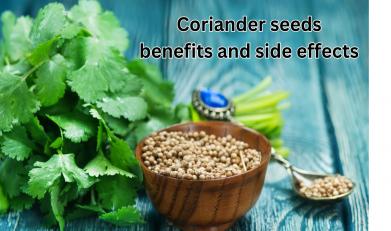

22 May, 2024
Coriander seeds, derived from the coriander plant (Coriandrum sativum), have been used for centuries in culinary and medicinal applications. Known for their distinctive flavor and aromatic qualities, these small seeds pack a powerful punch in terms of health benefits. However, like any natural remedy, they also come with potential side effects. This blog explores the benefits and side effects of coriander seeds to help you make informed decisions about incorporating them into your diet.
1. Rich in Nutrients: Coriander seeds are a good source of dietary fiber, vitamins (especially vitamin C and K), minerals (such as iron, calcium, and magnesium), and antioxidants. These nutrients contribute to overall health and well-being.
2. Improves Digestion: Coriander seeds have long been used to treat digestive issues. They stimulate the production of digestive enzymes and juices, which can help in the proper breakdown of food and improve digestion. They are also known to reduce bloating, gas, and other symptoms of indigestion.
3. Regulates Blood Sugar Levels: Studies have shown that coriander seeds can help lower blood sugar levels by enhancing the activity of enzymes that help remove sugar from the blood. This makes them beneficial for people with diabetes or those at risk of developing the condition.
4. Anti-inflammatory Properties: Coriander seeds contain antioxidants like quercetin, which have anti-inflammatory effects. These properties make them useful in reducing inflammation and providing relief from inflammatory conditions such as arthritis.
5. Improves Heart Health: The seeds help in managing cholesterol levels by reducing bad cholesterol (LDL) and increasing good cholesterol (HDL). This balance is crucial for maintaining a healthy heart and preventing cardiovascular diseases.
6. Promotes Skin Health: Thanks to their antioxidant and antimicrobial properties, coriander seeds can help in treating skin conditions such as eczema, rashes, and inflammation. They also promote a clear, glowing complexion by detoxifying the skin.
1. Allergic Reactions: Some individuals may experience allergic reactions to coriander seeds, manifesting as skin rashes, itching, or respiratory issues. If you suspect an allergy, discontinue use immediately and consult a healthcare provider.
2. Lower Blood Pressure: While coriander seeds can help regulate blood pressure, they may cause hypotension (abnormally low blood pressure) in some people, especially if consumed in large quantities. This can lead to dizziness, fainting, and other related symptoms.
3. Photosensitivity: Coriander seeds contain compounds that may increase sensitivity to sunlight, leading to a higher risk of sunburn and skin irritation when exposed to the sun. It is advisable to use sunscreen or protective clothing if you are consuming large amounts of coriander seeds.
4. Pregnancy Concerns: Although coriander seeds are generally safe in culinary amounts, high doses are not recommended during pregnancy due to potential effects on hormone levels and uterine contractions. Pregnant women should consult their doctor before using coriander seeds as a supplement.
5. Digestive Issues: Ironically, while coriander seeds are known to aid digestion, consuming them in excess can cause digestive issues such as diarrhea and stomach cramps in some individuals. Moderation is key.
Coriander seeds offer a multitude of health benefits, from improving digestion and heart health to regulating blood sugar and enhancing skin health. However, they should be used with caution, especially if you are prone to allergies, have low blood pressure, or are pregnant. As with any natural remedy, it is important to consult with a healthcare professional before making significant changes to your diet or health regimen.
Incorporating coriander seeds into your diet can be a flavorful and health-boosting choice. By understanding their benefits and potential side effects, you can make the most of this ancient spice while safeguarding your health.